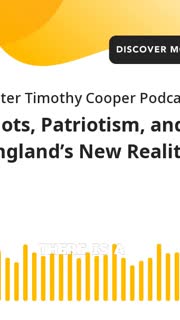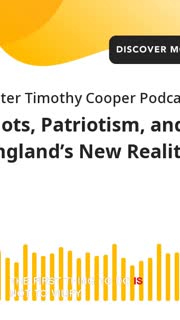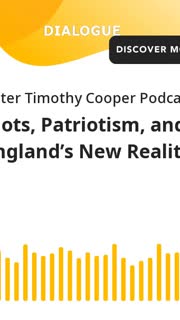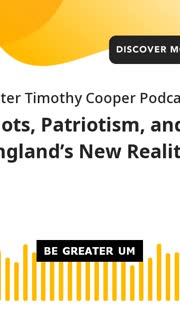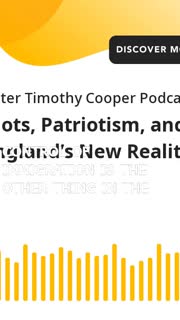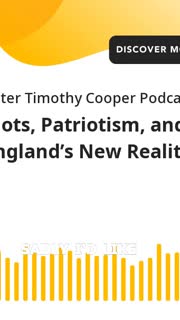Addressing Cultural Clashes: Violence, Immigration, and Integration
Devotional
Sermon Summary
Bible Study Guide
Sermon Clips
### Quotes for Outreach
1. "There is a problem uh in a breakdown in society certain behaviors which we were thought to be unthinkable are now very common uh you mentioned a particular knife attack and that's it's terrible it's shocking yeah and yet it's becoming more and more common we hear about these incidents um every day if you broaden your scope you know news and not just in england but in england they're very common." [02:54] (27 seconds)
2. "The first thing to do is not to vilify um groups of patriotic english people gathering together uh they've been blamed um for the actions of a few but also uh the the issue is that they're angry it's a bubbling up anger as i say it's not just one incident correct you were saying that we use one example but um it's becoming more and more and most of them are muslim but not exclusively it's due to a clash of cultures." [07:02] (31 seconds)
3. "You need to have dialogue you need to be able to talk to your neighbors in the community i mean that's that's just a prerequisite you need to be able to talk to these different communities that um particularly if they're a big enough sort of community within a city or something like that or maybe they've they've they've burgeoned so they're taking over a whole town as in some cases in the northeast of england." [10:01] (23 seconds)
### Quotes for Members
1. "There needs to be greater um honesty in reporting on it including from the police for example let's go back to our example of this attack um the police immediately announced that it was not a terrorist attack but in the same breath said that they didn't know the motive correct what if you don't know the motive how do you know it's not a terrorist attack exactly you don't know that so that means you're lying." [07:02] (25 seconds)
2. "Control of immigration is the other thing in the immigration needs to be at such a level that people can be integrated uh integration while i can involve the churches and other cultural groups uh but it takes time so there needs to be and this is something that i'm the the conservative party didn't want to do and it looks and i can't see the labour party doing it but there needs to be a hold on all immigration maybe for five years." [08:29] (30 seconds)
3. "It'd be nice to be able to say yes well uh christianity and islam has a lot in common which it does so therefore we could come together no because there are certain fundamental differences uh which mean that within islam the actual teachings of islam the violence is condoned and therefore and therefore um the only way is an over a sort of an overarching change in culture to bring the country to bring england back to being a christian country there's no other way." [15:33] (33 seconds)
4. "I don't see sadly i'd like to be able to say there is a solution we can just be friendly to each other we can't there's a battle on an ideological battle and and one side is winning because the other side hasn't even hasn't even drawn arms yet i mean of course i'm doing ideological battle endorsing any violence but um i suppose the first step if you say the first step is recognizing that at the heart of islam interesting to hear their viewpoints." [17:25] (43 seconds)
Ask a question about this sermon
1. "There is a problem uh in a breakdown in society certain behaviors which we were thought to be unthinkable are now very common uh you mentioned a particular knife attack and that's it's terrible it's shocking yeah and yet it's becoming more and more common we hear about these incidents um every day if you broaden your scope you know news and not just in england but in england they're very common." [02:54] (27 seconds)
2. "The first thing to do is not to vilify um groups of patriotic english people gathering together uh they've been blamed um for the actions of a few but also uh the the issue is that they're angry it's a bubbling up anger as i say it's not just one incident correct you were saying that we use one example but um it's becoming more and more and most of them are muslim but not exclusively it's due to a clash of cultures." [07:02] (31 seconds)
3. "You need to have dialogue you need to be able to talk to your neighbors in the community i mean that's that's just a prerequisite you need to be able to talk to these different communities that um particularly if they're a big enough sort of community within a city or something like that or maybe they've they've they've burgeoned so they're taking over a whole town as in some cases in the northeast of england." [10:01] (23 seconds)
### Quotes for Members
1. "There needs to be greater um honesty in reporting on it including from the police for example let's go back to our example of this attack um the police immediately announced that it was not a terrorist attack but in the same breath said that they didn't know the motive correct what if you don't know the motive how do you know it's not a terrorist attack exactly you don't know that so that means you're lying." [07:02] (25 seconds)
2. "Control of immigration is the other thing in the immigration needs to be at such a level that people can be integrated uh integration while i can involve the churches and other cultural groups uh but it takes time so there needs to be and this is something that i'm the the conservative party didn't want to do and it looks and i can't see the labour party doing it but there needs to be a hold on all immigration maybe for five years." [08:29] (30 seconds)
3. "It'd be nice to be able to say yes well uh christianity and islam has a lot in common which it does so therefore we could come together no because there are certain fundamental differences uh which mean that within islam the actual teachings of islam the violence is condoned and therefore and therefore um the only way is an over a sort of an overarching change in culture to bring the country to bring england back to being a christian country there's no other way." [15:33] (33 seconds)
4. "I don't see sadly i'd like to be able to say there is a solution we can just be friendly to each other we can't there's a battle on an ideological battle and and one side is winning because the other side hasn't even hasn't even drawn arms yet i mean of course i'm doing ideological battle endorsing any violence but um i suppose the first step if you say the first step is recognizing that at the heart of islam interesting to hear their viewpoints." [17:25] (43 seconds)
